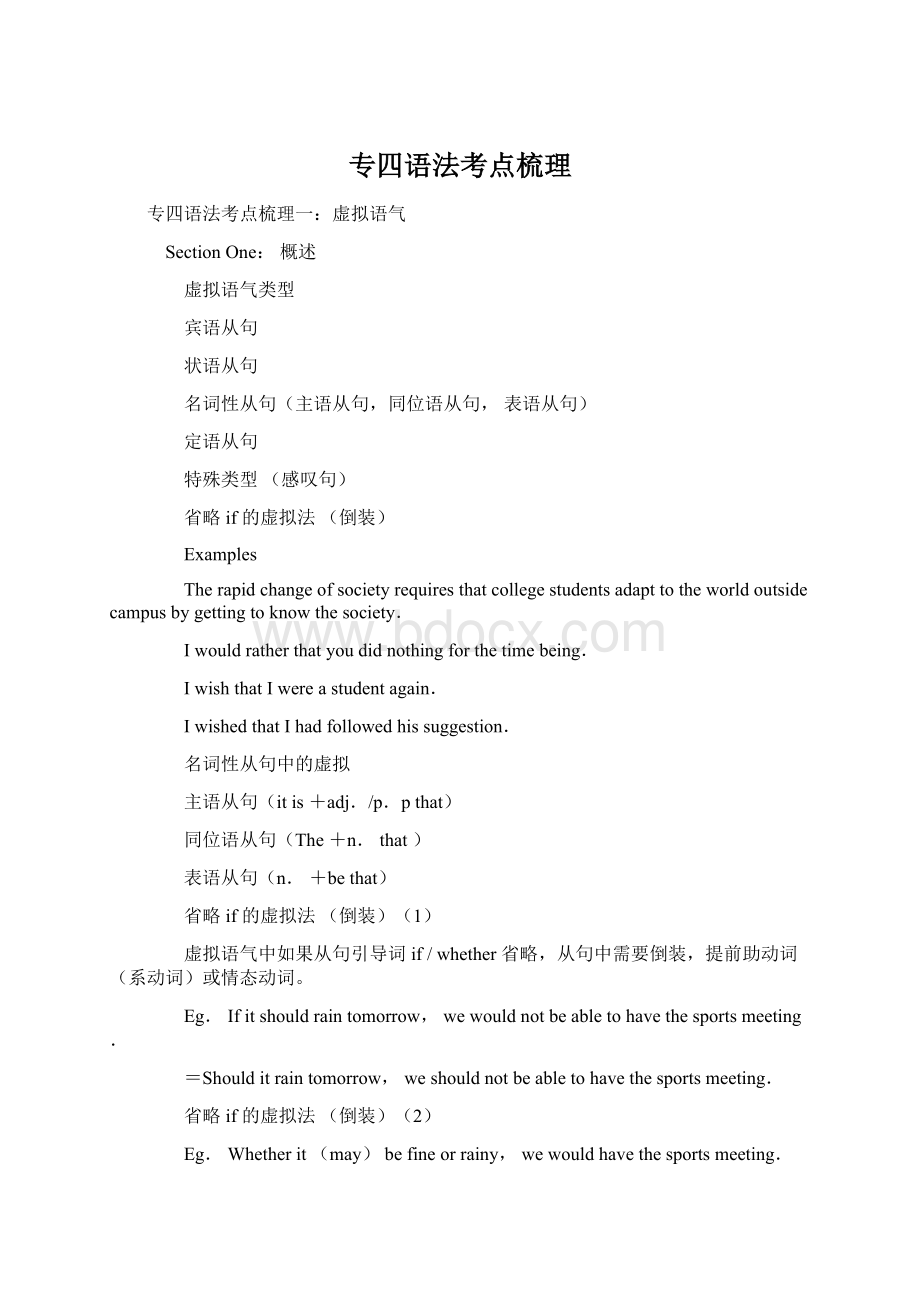专四语法考点梳理.docx
《专四语法考点梳理.docx》由会员分享,可在线阅读,更多相关《专四语法考点梳理.docx(50页珍藏版)》请在冰豆网上搜索。

专四语法考点梳理
专四语法考点梳理一:
虚拟语气
SectionOne:
概述
虚拟语气类型
宾语从句
状语从句
名词性从句(主语从句,同位语从句,表语从句)
定语从句
特殊类型(感叹句)
省略if的虚拟法(倒装)
Examples
Therapidchangeofsocietyrequiresthatcollegestudentsadapttotheworldoutsidecampusbygettingtoknowthesociety.
Iwouldratherthatyoudidnothingforthetimebeing.
IwishthatIwereastudentagain.
IwishedthatIhadfollowedhissuggestion.
名词性从句中的虚拟
主语从句(itis+adj./p.pthat)
同位语从句(The+n.that)
表语从句(n.+bethat)
省略if的虚拟法(倒装)
(1)
虚拟语气中如果从句引导词if/whether省略,从句中需要倒装,提前助动词(系动词)或情态动词。
Eg.Ifitshouldraintomorrow,wewouldnotbeabletohavethesportsmeeting.
=Shoulditraintomorrow,weshouldnotbeabletohavethesportsmeeting.
省略if的虚拟法(倒装)
(2)
Eg.Whetherit(may)befineorrainy,wewouldhavethesportsmeeting.
=Beitfineorrainy,wewouldhavethesportsmeeting.
Ifshehadbeengivenmoreinformation,shecouldhaveansweredthequestions.
=Hadshebeengivenmoreinformation,shecouldhaveansweredthequestions.
SectionTwo:
虚拟语气的动词标志
"insist,suggest,require,request,demand,propose,prefer,maintain,move,urge,recommend,command,order"等动词表"建议、愿望"时,其后宾语从句中谓语动词要用虚拟语气。
Should+V
wish其后宾语从句中谓语动词要用虚拟语气。
虚拟语气的名词标志
1 “necessity”或“suggestion”等名词后面的表语从句或同位语从句中的谓语动词要用虚拟语气。
2 名词word表“命令”时,其后主语从句、表语从句或同位语从句中,谓语动词需用虚拟语气 (should)+V。
3 wish作名词时其后主语从句,表语从句或同位语从句中,谓语动词需用虚拟语气(should)+V。
虚拟语气的形容词标志
Itis+adj.that句型中出现形容词如necessary,important,vital,decisive,critical,crucial,urgent,strange,desirable,advisable,disappointing,或过去分词充当的形容词如suggested,proposed,advised,demanded,requested,required等时,that 句中用should+V 表示虚拟。
虚拟的介词标志
But for相当于ifithadnotbeenfor。
Butforherhelp,Iwouldhavelostmyway.
Without,intheabsenceof等组成的短语可相当于一个虚拟的条件从句。
Withoutthelightandheatofthesun,whatwouldbecomeofalltheanimalsonearth?
Intheabsenceofwater,plantswouldnotgrowwell.
Under…condition,也可相当于一个虚拟条件从句。
Undermorefavorableconditions,wewouldhavemademoreachievements.
错综时间的虚拟
条件状语从句中谓语动词的形式可与主句中谓语动词的形式不“配套”,即错综时间的虚拟。
IfhehaddoneasIhadsuggestedthen,hewouldn'tberegretfulnow.
Iftheyhadn'tfoundusthen,wewouldstillbemissingonthesea.
IfIhadn'tmadesufficientpreparationfortheexamthen,Iwouldn'tbeincollegenow.
虚拟和事实
(前虚拟后事实)标志:
but
Eg.Iwouldhavegonetothepartywithyou,butIwastoobusy.
= IfIhadn'tbeentoobusy,Iwouldhavegonetothepartywithyou.
(前事实后虚拟)标志:
otherwise
Eg.Iwastoobusythen,otherwiseIwouldhavegonetothepartywithyou.
MoreInformation
was(were)+tohavedone(不定式完成式)表示“原来想做而未做”后面通常but…(陈述语气)。
Eg.Iwastohavearrivedhomeontime,butmycarwasheldupbyabadtrafficjam.
hadhoped表示过去未实现的愿望,其从句中谓语动词要用虚拟would+V。
Eg.Ihadhopedthathewouldagreetolendmethemoney.
专四语法考点梳理二:
反义疑问句
TagQuestions反意疑问句
DetailedPoints
首先判断是助动词还是情态动词
1.Haveto
反意疑问句的陈述部分谓语有haveto时,附加疑问句通常用助动词do。
Youhavetostudyhard,don'tyou?
Idon'thavetogetupearly,doI?
Theyhadtoobeytherulesandregulationsoftheschool,didn'tthey?
Shedidn'thavetodoitherself,didshe?
2.Need
反意疑问句的陈述部分谓语有need时,need做情态动词,附加疑问句仍用need,need做实义动词时,附加问句用助动词do。
Theyneedn'tmakesuchaloudnoise,needthey?
Heneedsthemoneyforhisson'seducation,doesn'the?
3.Hadbetter
反意疑问句的陈述部分为hadbetter时,附加问用助动词had。
Youhadbettergoatonce,hadn'tyou?
We'dbettercalloffourappointment,hadn'twe?
4.Wouldrather
反意疑问句的陈述部分为wouldrather时,附加问句用情态动词would。
You'drathernotdoit,wouldyou?
Shewouldratherdiethansurrendertotheenemy,wouldn'tshe?
5.Usedto
反意疑问句的陈述部分为usedto时,附加问句用助动词did。
YouusedtostayuplateeveryeveningwatchingTV,didn'tyou?
6.Oughtto
反意疑问句的陈述部分为oughtto时,附加问句用助动词should.
Sheoughttogobyplane,shouldn'tshe?
Weoughtnottolaughatothers'mistakes,shouldwe?
7.Must
反意疑问句的陈述部分有must,附加问句分三种情况:
⑴mustdo—mustn't必须
⑵mustbe—随人称用系动词一般现在时
⑶musthavedone—didn't
(4)must有必要—needn’t
①Wemustbooktheticketinadvance,mustn'twe?
(必须)
②Shemustbeintheoffice,isn'tshe?
(肯定)对现在事情的肯定猜测。
③Hemusthavedonehishomework,didn'the?
(肯定)对过去事情的肯定猜测。
4youmustgoandhavealook,needn’tyou?
8.Wish
反意疑问句的陈述部分是wish时,附加问句用情态动词may。
Iwishtoshakehandswithyou,mayI?
人称和数
1.陈述部分主语是"I"时,附加问句的人称分二种情况:
⑴Ihopethat…,don'tyou?
Ican'tbelieveit,canyou?
⑵Iwillbe14tomorrow,aren'tI?
I aminterestedinit,aren'tI?
2.
陈述部分主语是everything、nothing、something等时看作单数,附加问句用it指代。
陈述部分主语是everyone、everybody、nobody、somebody、someone、noone、anybody、anyone等时看作复数,附加问句用they指代。
陈述部分主语是不定代词one时,附加问句用one指代。
3.
Nothingisamazingthere,isit?
Something willhavetobedoneabouttheprice,won'tit?
Nobodyisleavingtomorrow,arethey?
Everyonehopestogetpromoted,don'tthey?
Someonelefttheirumbrellainthebus,didn'tthey?
Onecan'tbetoocareful,canone?
祈使句后面的附加问句
1.祈使句后面的附加问句,分三种情况;
⑴表客气、委婉、邀请、劝诱、愿望等时,用won'tyou。
Haveacupofcoffee,won'tyou?
⑵表命令、强制的要求、请求时,用willyou。
Doitatonce,willyou?
⑶否定祈使句用willyou。
Don'tclosethedoor,willyou?
2.
Let's和letus后面的附加问句,分两种情况;
⑴let's包括对方在内,用shallwe或shan'twe。
⑵letus不包括对方在内,用willyou或won'tyou。
Let后接非us之外的人称如me、him、her、them等时,附加问句用willyou。
3.
(1)Let句型
let'sgotothemovies,shallwe?
letusgotothemovies,willyou?
lethimgo,willyou?
letmeattendthefarewellparty,willyou?
(2)There+be句型的反意疑问句
There+be句型的反意疑问句,附加问句用bethere/benotthere,由主语人称时态和数决定。
Therewon'tbeanytrouble,willthere?
There'snotmuchnewsintoday'spaper,isthere?
Therehasbeenmuchconfusionsincehisarrival,hasn’tthere?
(3)This/that/Itis/wasthethirdtimethat句型
This/that/Itis/wasthethirdtimethat等句型中,反意主句,用it指代。
Thisisthethirdtimethisweekhehasbeenlate,isn't it?
ItwasthesecondtimethatshehadbeentotheGreatWall,wasn'tit?
主从复合句
1.
Ithink(suppose…)宾语从句结构,附加问句反意从句分两种情况;
⑴前肯定句,后用否定句。
Ithinkthatheisserious,isn'the?
⑵前有否定句,后面附加问句用肯定(Idon'tthink)。
Idon'tsupposethatsheisserious,isshe?
上述主从复合句主句主语是第一人称以外的人称时,反意主句。
TheythinkMarywillpasstheexamination,don't they?
2.
Ihope+宾语从句结构,附加问句用don'tyou。
Ihopethattheystudyhard,don'tyou?
感叹句后的附加问句
感叹句后的附加问句指人时,根据人称、数决定用什么指代。
指物时,根据单复数决定,用it/they指代。
Whataninterestingstory,isn'tit?
Whatafunnyman,isn'the?
Howsillytheyare,aren'tthey?
专四语法考点梳理三:
倒装句
Inversion倒装
带否定意义的副词置于句首时
带否定意义的词置于句首时,主谓语需要倒装。
Rarelydoeshegotothemovies.
Notforamomentdidhedoubtthetruthofherhonesty.
LittledoIknowaboutthemeaningofthisproverb.
NeverbeforethenighthadIfelttheextentofmypower.
含有否定词的介词短语在句首时
含有否定词的介词短语在句首时,句子主谓倒装。
这类介词短语包括:
innocase,atnotime,innoway,bynomeans,onnoaccount,innosense,undernocircumstances,等等。
意思为“决不,在任何情况下都不。
”
“Only+状语”置于句首时的倒装
“Only+状语”置于句首时,主谓语需要倒装。
1)OnlybypracticingalotoutsideclasscanwespeakEnglishfluently.
2)OnlywhenIsawhimdidIrememberthatIpromisedtobringhimagift.
3)OnlythendidIknowthatIwaswrong.
notonly位于句首时的倒装
句首是notonly且连接分句结构时,引起局部(部分)倒装。
Notonlydidweloseourmoney,butwewerealsoindangeroflosingourlives.
Notonlycanhesingverywell,buthecanalsoplaysomemusicalinstrumentveryskillfully.
neither,nor表示“也不”时的倒装
句首是neither,nor表示“也不”时,主谓语需要倒装。
Icouldn'tsolvetheproblem,neither/norcouldmybrother.
=Icouldn'tsolvetheproblem.Mybrothercouldn't,either.
Ididn'tgotoschool,nordidMary.
=Ididn'tgotoschool.Marydidn't,either.
so表示“也是,同样”时的倒装
句首是so表示“也是,同样”时,主谓语需要倒装。
Copperisagoodconductor;soissilver.
Johnfailedintheexam;sodidMark.
Hetakespartinsportsactivities,sodohisclassmates.
IhavebeentotheTempleofHeaven,sohasshe.
平衡倒装
There+be或其它不及物动词come,go,happen,occur,stand,exist等结构中,为避免句子头重脚轻,平衡倒装。
Therestandsanoldhousethatisbeingpulleddown.
Thereexistedahostilerelationshipbetweenthetwofamilies.
Therearemanyhobbiesinvolvingthecreativityofaperson.
Such/so…that句型中的倒装
Such/so…that句型中such+名词或so+形容词,副词等位于句首时,主句中主谓倒装。
Sobadlywasheinjuredintheaccidentthathehadtostayinthehospitalfortreatment.
SoexcitedwasIthatIdidn’tknowwhattosay.
比较状语从句中的倒装
than引导的比较状语从句中,主从句谓语趋向中间以达到平衡,此时从句要求主谓倒装。
Nowadays,withtherapiddevelopmentofscienceandtechnology,manislesslimitedbynaturethanwerehisforefathers/ancestors.
表频率的状语至于句首倒装
表频率的状语至于句首,倒装。
Manyatimehashegivenussoundadvice.
Twiceaweekdoeshegotovisithisgrandparents.
Morethanoncehaveweheardhimmakesuchpromises.
As,though让步状语从句中倒装
在以as,though引导的让步状语从句中,从句常用倒装语序,把表语或状语提前。
(名,形,副,动词)
Childthatheis,hecandistinguishbetweenrightandwrong.
Intelligentas/thoughyouare,youshouldbemodest.
MuchasIadmirehim,Idon'tthinkheisperfect.
Tryasshedid,shefailedagain.
虚拟语气中的倒装
虚拟语气中省略“if”或“whether”时的倒装。
Wereitlefttometochoose,Ipreferthelattertotheformer.
Haditnotrainedsoheavily,wewouldhavevisitedtheSummerPalaceyesterday.
Bewerichorpoor,weshouldhaveourowndignity.
副词至于句首
Here、there、in、out、up、down等表示方位的副词至于句首时,主谓需要倒装。
Herecomesthebus.
Theretheywent.
专四语法考点梳理四:
主谓一致
Subject&VerbAgreement
主谓一致
集体名词做主语
集体名词做主语时,谓语动词情况有三种
①有些集体名词如cattle、folk、people、youth、clergy(教士)、police等常做复数看。
Thepolicehavecaughtthemurderer.
集体名词做主语
②有些集体名词(表示总称)如machinery、stationery,merchandise(商品)、foliage,(树和植物叶子的总称)furniture,e